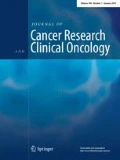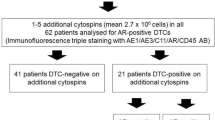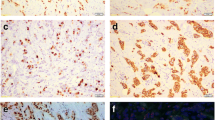Abstract
Purpose: The usefulness of steroid receptor content in breast cancer metastases for metastatic disease therapy planning was examined in this study. Methods: Steroid receptors in primary tumors and corresponding metastases in the same breast cancer patients (n=23) were determined by five-point DCC assay. We carried out an analysis of the therapeutic response and comparison of the progression-free interval of patients treated with endocrine/chemo-endocrine therapy for metastatic disease according to the positive/negative progesterone receptor status of primary tumors, or of breast cancer metastases. Results and conclusions: It seems that the lack of positive progesterone receptors in metastasis (0/8) and conversion from PR+ primary to PR– metastasis (5/8) may be important in describing the non-responder phenotype. We obtained a similar progression-free interval in patients with progesterone receptor-positive/negative primary tumors, but a longer progression-free interval in the patients with progesterone receptor-positive metastases (n=9) than with negative ones (n=14), indicating the possibility of using steroid receptor content from metastases for metastatic disease therapy planning.
Similar content being viewed by others
Author information
Authors and Affiliations
Additional information
Electronic Publication
Rights and permissions
About this article
Cite this article
Branković-Magić, M., Janković, R., Nešković-Konstantinović, Z. et al. Progesterone receptor status of breast cancer metastases. J Cancer Res Clin Oncol 128, 55–60 (2002). https://doi.org/10.1007/s00432-001-0299-9
Received:
Accepted:
Published:
Issue Date:
DOI: https://doi.org/10.1007/s00432-001-0299-9




